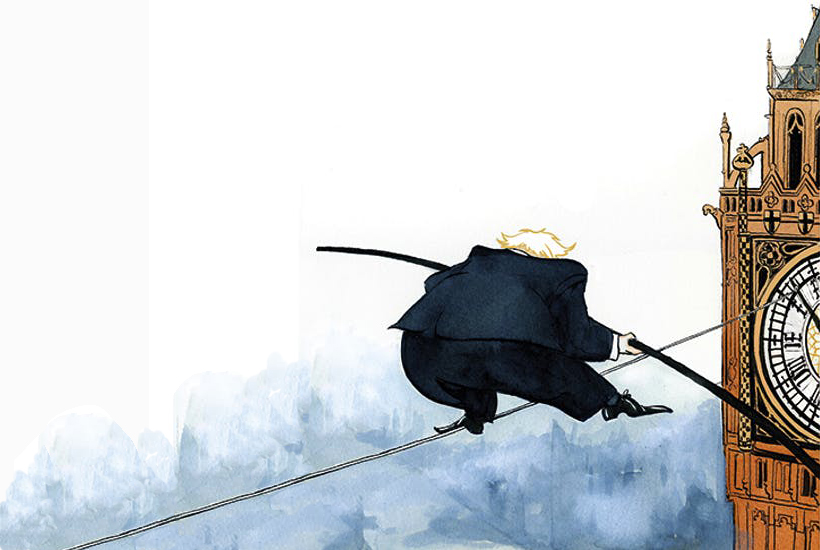Here is my ideal scenario. Having failed to push through a deal to leave the European Union, either in the House of Commons or with the EU, Boris Johnson abides by the terms of the Benn Act and drafts a letter requesting an extension to the October 31 deadline. That extension would be eight minutes and 21 seconds, approximately the time it takes light to travel from the sun to earth — depending slightly, of course, on where we are in our orbit at the time.
The prime minister could claim this would respect the letter of the Benn Act, if not, um, entirely the spirit. Having done this, Boris should then proceed to a no-deal Brexit — or what the BBC refers to as a ‘crash-out-and-burn-in-the-fieriest-pit-of-hell Brexit’ — with a brutality that would have made Marshal Zhukov blanch. It is just about the only way I can see of a) getting a clean Brexit and b) minimizing the risk of the scenario I still think is easily the most likely denouement to this whole charade — to wake up one dank morning in late November, with sodden leaves and a sun the color of stale egg yolk, to find that Old Man Steptoe and his retinue of imbeciles are now governing the country, propped up by the jabbering, dwarfish, thin-lipped Picts and the Liberal ‘Democrats’ (sic).
You have the advantage over me, in that you know, or are about to know, what happened on our exciting deadline day. My deadline came a little earlier. It may be that by the time you read this, the entire country will have dropped its affection for Brexit given the profusion of no-deal scare stories doing the rounds. The latest, and most chilling perhaps, is that the large quantities of sperm we import from the EU will immediately dry up, so to speak, if we have no deal. This is a country that fought and won two world wars. I had no idea we were now dependent for our existence on gallons of imported cut-price Danish spunk, nor why we should be. Whatever, events move more quickly than time itself these days — but no matter what happens this weekend, only the above scenario would prevent a weak Brexit or no Brexit at all, a second referendum and very quickly a government of none of the talents. Here’s why.
If Boris somehow succeeds in getting his deal through, it will meet with the implacable opposition of Nigel Farage’s Brexit party and probably a large handful of Conservative MPs. This is because the deal is scarcely any better — and in some ways worse — than the one that Theresa May failed to get through the House of Commons. In which case the prime minister will have to rely on the hope that the entire Leaver vote becomes so sick of the whole corrosive process that they swing behind the deal and thus the Conservative party. Some undoubtedly will think precisely that, following Tom Harris’s dictum that ‘I’ve got about half of what I voted for in the referendum, so I’ll be happy with that.’ However, many will not and Boris, remember, needs to gain more than 40 seats. The Brexit party in this scenario will field candidates in pretty much every constituency, sapping — largely — the Tory vote.
The polls at the moment have given cheer to the Conservatives, but to my mind false cheer. The latest put the party on about 34 percent and Labour eight points behind on 26 percent. The psephologist Sir John Curtice suggests that this could give Boris a majority in the House of Commons by the slenderest of margins. But that is to ignore geographical factors, the role of the Brexit party and the volatility of the electorate. The Tories may indeed be shoring up their vote in seats they already possess, but there is no evidence whatsoever that they have the ability to gain seats in the north-east and north-west of England. The Brexit party is still well into double figures in the polls; for its threat to the Tories to be largely redundant this figure needs to fall to 5-6 percent, and it shows no signs of doing that. Furthermore, those voters who do decamp from the Brexit party will return to the Tories only in those areas where they don’t need them. Following the pattern of the decamped Ukip vote in 2017, former Brexit party voters in areas away from the south-east of England will more likely return to their habitual Labour (or even Lib Dem, paradoxically) berths.
But even in the south-east the Tories will not have it all their own way — certainly not in London. The party currently holds 21 seats in our fervently Remain-minded and increasingly woke capital. My suspicion is that it will lose eight to ten of them — in places such as Putney, Cities of London and Westminster, Harrow East and Wimbledon, where the swing required by Labour or the Lib Dems is around or below (very much below in some cases) 5 percent. It is perfectly possible, if not probable, that should the Lib Dems and Labour reach some sort of electoral pact in Uxbridge and South Ruislip, where the swing needed is only 5.39 percent, the prime minister himself could be out of a seat.
In 2017 the Conservative party won 13 seats in Scotland, its best performance since 1983. There is scant hope that it can add to that figure and the far greater probability is that it will lose about half of them. In the south-west the Tories face the resurgent Lib Dems and again will lose more seats than they gain, half a dozen or so by my reckoning.
Add all that stuff together and Boris falls well short of an overall majority — and by my conservative calculation will lose at least 20 in the regions mentioned above. That leaves him about 65 seats short of a majority, and with only a limited swath of the country in which to harvest those seats. There is hope for Boris in the Midlands (the East Midlands especially) and parts of East Anglia. Many of the Tory targets, however, are in the north — and yet it seems to me highly unlikely that Boris will carry with him the likes of say, Bishop Auckland, Hartlepool and Stockton South. It seems more likely that the sole Conservative gain from Labour in the north-east in 2017 — my own constituency of Middlesbrough South and East Cleveland — will return to the Labour party.
In the north, the Brexit party vote will remain strong in those areas most dispossessed, where the Tories are disliked both tribally and viscerally and also for ‘austerity’. The Queen’s Speech and spending plans directed specifically at these areas are too recent to have properly bedded down in the minds of the electors — nor does Boris play very well on the stump in such regions. The Tories will maintain their grasp of rural northern seats, but will struggle in the cities to win either the increasingly cosmopolitan vote, or the votes of the truly poor. My guess is that Labour could end up the largest party of a ruling coalition by making only the most modest gains, coasting to power on the back of revivals for the Lib Dems and the SNP.
This scenario is predicated upon Boris getting another bugger’s muddle of a deal through. But it applies even more so if his deal does not go through. If that happens, he will be tied in the minds of the electorate to a Brexit deal which was unattractive and which in any case failed once again. The Brexit party will stand against him in every seat, the Leave vote will be split. Only by championing no deal will our prime minister be able to nullify the threat of Nigel Farage and present the election as being a reformist, One Nation Tory party against a liberal elite which has betrayed the electorate.
I’m sorry if all this depresses you. Perhaps I’m wrong and Boris will be swept home to victory by a grateful public who recognize that he did the best he could, which is what Boris’s team (if not Conservative Central Office) thinks will happen. You cleave to that belief if you want to. Me? I see only darkness and despair, and the looming specter of John McDonnell.
This article was originally published in The Spectator’s UK magazine. Subscribe to the US edition here.



















